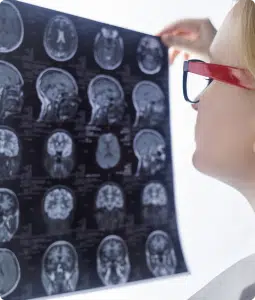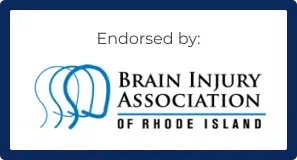Traumatic Brain Injury Symptoms
Symptoms of a traumatic brain injury (TBI) vary depending on the type and severity of the injury and which part of the brain was injured. Traumatic brain injury symptoms may appear soon after the injury or become apparent hours, days, or even weeks later. Medical care is crucial for severe brain injuries, as permanent disability or death can occur.

Every year, over a million Americans experience a traumatic brain injury (TBI). According to the Centers for Disease Control and Prevention (CDC), a traumatic brain injury occurs from a bump, blow, or jolt to the head or from a penetrating injury to the head. There are three classes of TBI: mild, moderate, and severe.
After sustaining a TBI, people may experience minor to serious symptoms. The symptoms of a mild TBI can easily be overlooked, so it’s important to know what to look for and when to seek medical care. Many people with a mild TBI will fully recover, although some may have lasting effects from their brain injury.
Severe TBIs generally lead to more noticeable symptoms and require urgent medical care. Recovery is possible, and appropriate medical treatment and rehabilitation can maximize the chances of a good outcome.
Common Symptoms Of Traumatic Brain Injuries
The symptoms of a TBI can vary depending on the type and severity and the part of the brain that was injured. Traumatic brain injury patients will exhibit a range of symptoms, and the injury will manifest differently from one person to the next.
In general, however, the symptoms of a mild TBI are less evident than those of a more severe injury.
Symptoms of a Mild TBI
A mild TBI is also known as a concussion. According to the StatPearls database, approximately 75 percent of TBIs are considered mild.
The CDC categorizes the following as symptoms of a mild traumatic brain injury:
- Headaches
- Increased sensitivity to light or sound
- Dizziness
- Problems with balance
- Nausea and vomiting
- Fatigue or low energy levels
- Trouble concentrating
- Memory problems
- Feeling “foggy” or “groggy”
- Feeling anxious or nervous
- Irritability
- Trouble falling asleep
- Sleeping less or more than usual
Some of these symptoms can be confused with those of other conditions. Additionally, it’s fairly common for people with mild TBIs to downplay their symptoms because they may not recognize them as an indication of a brain injury.
Symptoms of a Moderate to Severe TBI
The symptoms of a mild TBI can also occur with a more severe injury. People with moderate to severe traumatic brain injury may experience:
- Loss of consciousness, which may last from several minutes to hours
- Persistent or worsening headache
- Severe nausea and vomiting
- Numbness or tingling in the hands, arms, feet, or legs
- Muscle weakness
- Loss of coordination
- Slurred speech
- Confusion or agitation, or otherwise unusual behavior
- Seizures or convulsions
- Dilation of one or both pupils
- Clear fluid draining from the nose or ears
- Inability to awaken from sleep
Following a serious head injury, people who experience these symptoms should seek urgent medical care. If you’re with someone who has sustained a head injury and displays one or more of these symptoms, get them medical attention as soon as possible.
When Do Symptoms Of A Tbi Start To Show?
Traumatic brain injury symptoms may start soon after the injury. However, it’s also possible for symptoms to be delayed by days, weeks, or even months. For example, the Asian Journal of Neurosurgery reveals that 60 percent of people who developed sensitivity to light following a mild TBI reported noticing this symptom around three months after the injury.
The onset of TBI symptoms can vary, with some appearing early and then resolving and others developing much later.
Scientists are still working to understand the factors involved in recovery from a traumatic brain injury. Some experts believe that a mild TBI can cause biochemical changes in brain cells and alter their function. Changes in brain blood flow may also contribute.
This cascade of changes is set in motion by the TBI, but they may take some time to manifest fully, which explains why symptoms may not be apparent right away. Researchers hope to discover more about how a mild TBI affects the brain, leading to better TBI treatments.
If you’ve experienced a traumatic brain injury, talk with your doctor about their specific recommendations.
Postconcussion Syndrome
When the symptoms of a mild TBI persist beyond the expected three-month recovery period, this is referred to as postconcussion syndrome, or PCS.
There is no universally accepted definition for PCS, making research difficult. Past research suggests that about 15 percent of people continue to experience symptoms more than three months after their concussion, but newer research indicates patients may continue to show cognitive changes a year or more after the injury.
Secondary Brain Injury
Primary brain injury refers to a sudden injury to the brain at the time of impact. Secondary brain injury refers to the changes in the brain that progress over hours, days, and weeks following the primary brain injury.
During this time, changes to various brain components, including cells, chemicals, blood vessels, and tissue, can take place.
Secondary brain injury can occur due to several factors, including:
- Swelling of the brain, which increases the pressure inside the skull and causes further brain damage
- Bleeding in the brain, which increases pressure and irritates brain cells
- Biochemical and metabolic changes
Treatment for a moderate to severe TBI includes methods for reducing the extent of secondary brain injury. This includes managing body temperature and giving medications to patients to decrease the amount of pressure that builds in the skull.
Long-Term Outcomes After Severe TBI
A severe TBI can be a fatal injury. Each year in the United States, approximately 52,000 deaths result from traumatic brain injury.
Those who survive a severe TBI don’t always recover fully. Research published in Frontiers in Neurology has shown that about a third of patients had made a good recovery eight years after their injury. Nearly half remained moderately disabled, and approximately 20 percent remained severely disabled. Rehabilitation after the injury can help patients regain as much lost function as possible.
When To Seek Medical Treatment After A Brain Injury
Unfortunately, many people don’t seek medical attention after experiencing a TBI. A 2005 internet survey revealed that older respondents, those who’d experienced a relatively mild brain injury, or who were injured in their homes were the least likely to seek treatment.
According to the researchers, most of the respondents reported post-concussive symptoms. The most common response for not seeking care was “I didn’t think I needed care.”
If you experience a head injury and have persistent symptoms, you should go to the emergency room as soon as possible.

Danger Signs in Adults
- A headache that gets worse and won’t go away
- Vomiting repeatedly
- Inability to recognize people or places
- Loss of consciousness or cannot wake up
- Weakness, numbness, loss of coordination, or seizures
Danger Signs in Children
The danger signs in adults also apply to children, along with:
- Non-stop crying
- The inability to console
- Refusal to nurse or eat
For adults and children, these danger signs may indicate a potentially fatal buildup of pressure in the skull. Seeking care as soon as possible is crucial. Treatment can reduce the damage to the brain and maximize the chances of recovery from the injury.
In some cases, less severe traumatic brain injuries are not considered a medical emergency, but medical professionals still strongly recommend that you get checked out by a doctor. If you experience one or more traumatic brain injury symptoms following a head injury, make an appointment with your primary care physician for an evaluation to rule out a more severe brain injury and to get advice about how best to support your brain as it recovers.
The personal injury attorneys at Marasco & Nesselbush have experience with TBI cases and understand the unique needs of people and families affected by traumatic brain injuries. Our firm has recovered millions of dollars for TBI clients, including a $4.5 million settlement for a car accident victim.
Contact our law firm today to discuss your legal rights in the wake of a life-altering brain injury.

$4,500,000
Recovered for a client who sustained a traumatic brain injury in a car crash.
DO I HAVE A CASE?
If you think you may have a TBI case, contact us now for a FREE consultation